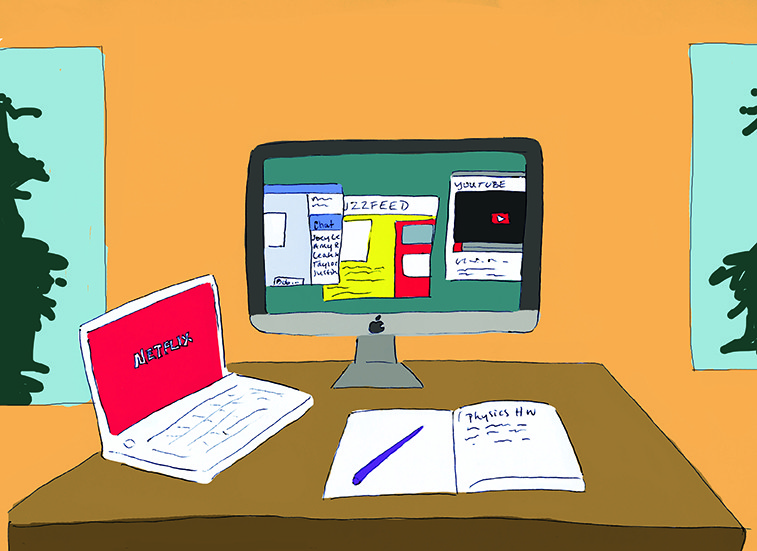Alex Hutchins
Opinions Editor
@aHutchCourant

How many tabs do you have open on your computer at this moment? Or, more specifically, how many of those tabs are actually related to the homework assignment you are supposed to be working on? If you’re like me, the answer to the latter question is unsettlingly low. Even if I start out with a clear goal of finishing a project in a timely manner, there is almost always some underlying urge that causes a frenzy of distracted clicking on Buzzfeed articles with titles like, “17 Gifs of Kittens Who Can’t Even,” CollegeHumor articles named “If Walter White was Danny Tanner from Full House” or YouTube videos of pretty much anything you can think of.
So at what point does a distraction become hurtful to completing something that requires a large amount of focus like writing a paper for your English class? If you asked American poet Billy Collins this question, he would probably tell you there is no such thing as distraction in writing, but rather that distractions are “clues to conclude your writing.” This same idea can also apply to your overall mentality. That is, distractions are really just your brain’s way of subconsciously working through a problem on the path of finding a conclusion.
In some ways it’s sort of like the effect a good night’s sleep can have on your thinking. There have been times in my life when a night of high quality rest has literally made the difference between Sherlock Holmes-esque focus (ok maybe not that good) and walking through the halls lost in a fog of drowsiness and confusion.
In the same way, distractions are a way for your brain to take a rest from the grind of studying math equations ‘till the a.m. or to relieve the stress that you put on yourself when completing a last-minute essay (a common conundrum). In both scenarios, the brain reboots itself, allowing it to come back to whatever you’re working on with a fresh perspective.
If you don’t believe me, look no further than the phenomenon known as “verbal cueing.” In a recent study by two researchers from both the University of Zurich and the University of Fribourg in Switzerland, it was found that playing audio recordings of different vocabulary words as the participants of the study slept was seen to significantly help with retention of the new vocab when they woke up.
However helpful distraction may be, the time you spend scrolling through your Facebook news feed seems anything but profitable when trying to put the finishing touches on that literary essay about Crime and Punishment. That is, if you ever return to the dark depths of the Google document with nothing on it other than an 18-font, Arial bold and underlined title at the top of the page.
But maybe I’m missing the point here, maybe the way we as a society qualify what’s valuable and what’s a waste of time is not necessarily as black and white as I thought. While assignments for school, work, and other goal-oriented projects can certainly be a source of pride and accomplishment, I would argue that you get an equal if not more rewarding feeling from spending time away from your work life. Whether it be watching YouTube videos that you can share and laugh about with friends, listening to music of an artist you and your friends plan on seeing in concert, or any other activity commonly seen as unproductive behavior, there’s a value to non-academic oriented time that is almost impossible to duplicate.




